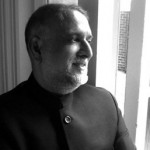Seminary training, for the most part, has failed to integrate the study of the Bible with the study of God’s works and God’s reason.
 That is the premise of a recent paper by our friend, Vishal Mangalwadi, founder and president of The Revelation Movement. A scholar, author, and speaker, Vishal is one of DNA’s Idea Shapers.
That is the premise of a recent paper by our friend, Vishal Mangalwadi, founder and president of The Revelation Movement. A scholar, author, and speaker, Vishal is one of DNA’s Idea Shapers.
Vishal’s paper was presented to a faculty forum at The Gospel and Plow School of Theology where he serves as Honorary Professor of Applied Theology. GPST is part of the Sam Higginbottom Institute of Agriculture, Technology and Sciences in Allahabad, India.
We are happy to publish Vishal’s paper, edited for length, in three installments. Go here to read it in its entirety.
~
INTEGRATING THE GOSPEL & THE PLOW
The pioneers of the modern missionary movement did not establish a Bible seminary/institute or school. In order to bless India, those Calvinist-Baptists founded Serampore College in 1818. Their leader, William Carey, was one of the greatest Bible translators/publishers of all times. Yet, along with teaching the Bible, that cobbler-turned-linguist taught botany, horticulture, astronomy, forestry, and agriculture. He founded India’s Agri-Horticultural Society, built up India’s second best botanical garden in Serampore College, published scientific books, and pioneered Indian journalism. The college rapidly grew to become Serampore University in 1827.
The Serampore University Senate handed over the departments of liberal arts and science to the secular government and confined itself to teaching theology. Did their theology separate the “sacred” subject of divinity from “secular” studies?
This paper is a big-picture critique of the modern movement of theological seminaries/Bible institutes/Bible Schools.
Troubling Questions
- William Carey’s generation triggered India’s renaissance. Has our fragmented worldview made theological education relevant for heaven, but irrelevant for earth?
- As of today one cannot find a single copy of Sam Higginbottom’s book, The Gospel and the Plow (1921) in the library of the Sam Higginbottom Institute of Agriculture, Technology and Sciences (SHIATS). Is it because our theological education has no genuine interest in integrating theology with the “plow.” That is, with the science, sociology, economics, law, politics, and technology needed to bless India?
- Why did 20th century theology cease making the church the light of the world? Did the corruption of Western theology inflict this disease upon India?
- More importantly: Is this separation of theology from the rest of the academy responsible for marginalizing Christianity in the world’s premier Protestant nation – the United States of America?
Why Christianity Lost America
“Liberal theology” has self-destructed. From the outset, the idea was foolish that the Bible is man’s word, not God’s, yet human reason can systematize the “science of God” (theology). Today, hardly anyone studies Liberal theology to try to know God. Therefore, in this paper, the ‘Bible Institute/School/Seminary movement’ generally means evangelical theological institutions. The theological ethos that established these institutions was radically different from the worldview of the Puritans who founded Harvard (1636), Yale (1701), and Princeton (1746). These universities were created to train men and women to serve the Church and the world that God loves.
According to its motto adopted in 1692, America’s first college, Harvard, was started by Puritans for “Christ and the Church” (Christo et Ecclesiae). Harvard, which arguably wrote America’s DNA, is still the world’s number one university. It continues to shape America. Christianity lost America for several reasons, principally because it gave up its best Christian colleges and retreated into the Bible Seminary movement.
The Heart of the Matter: University vs. Seminary
Harvard’s iconic crest was adopted in December 1643. It made the pursuit of truth (VERITAS in Latin) the purpose of the university’s existence, because God wants “all people to be saved and come to the knowledge of the truth” (1 Timothy 2:4).
How do we discover truth? The Harvard Crest inscribed VERITAS on three books: 1) God’s words, 2) God’s works, and 3) God’s reason, reflected in His image – Man.
In order to discover truth, a student had to study all three and connect the dots discovered through them. The Bible Institute/Seminary movement departed from this holistic epistemology in an attempt to derive truth exclusively from the Scriptures – the book of God’s words.
The immediate intellectual force behind the Harvard crest was John Amos Comenius, (1592–1670) the last bishop of The Unity of the Brethren church. His ninety books on education made him the father of modern education. He also helped shape the modern Protestant theology of “Nation” that forged the 1648 “Peace of Westphalia.” That theology created nations such as the United States of America and India.
Samuel Hartlib and John Milton invited Comenius to England in the early 1640s to launch what would have been the world’s first “modern” college in Chelsea, London. The Civil War prevented the establishment of that college but two significant things came out of his time in London:
- Comenius laid the intellectual foundations of the Royal Society of Science. A majority (62 percent) of its founders were Puritans. At that time Thomas Hobbes was the only atheist thinker in England and that disqualified him to be a member of history’s most influential scientific society.
- New England’s Governor, John Winthrop, interacted with Comenius and brought his philosophy of Christian education to America.
Besides Comenius, Christian thinkers who shaped Harvard’s educational philosophy included Francis Bacon (1561–1626), Alexander Richardson (d. in or before 1629), William Ames (1576–1633), and John Alsted (1588–1638). They believed that truth is known through rational revelation.
– Vishal Mangalwadi
… to be continued
Shaping the Generation of the Future
What Happened to Education in America
School vs. Education: The Difference Matters
TECHNOLOGIA: The Most Powerful Concept of Education You Never Heard Of!






1 Comment